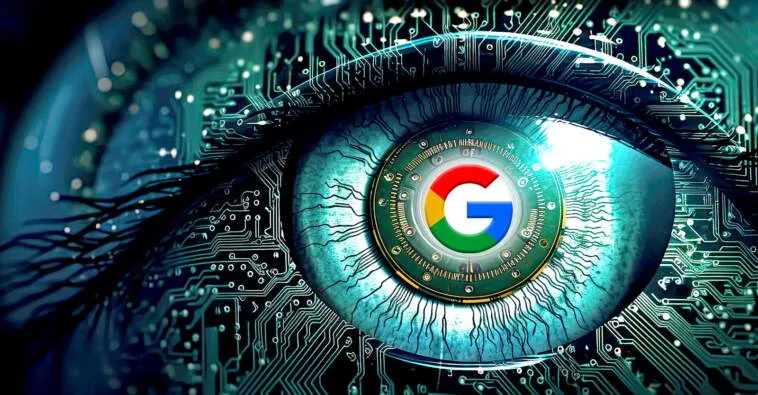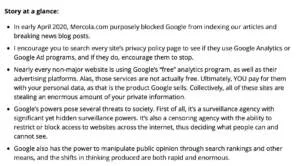(The Defender) In early April 2020, Mercola.com became one of the first websites to purposely block Google from indexing our articles and breaking news blog posts. Most of you are well aware that I’ve had concerns about the surveillance capitalists, spearheaded by Google, for a number of years.
In September 2017 I discussed Google’s partnership with the National Alliance on Mental Illness, and how their depression assessment quiz was in fact a drug promotion scam sponsored by the drug manufacturer Eli Lilly. No matter how you answered the questions, you were a candidate for antidepressants.
Since then, Google and other tech companies have only gotten deeper and wider access to people’s personal medical information, and Google’s selling of this data to third parties can have real-world consequences. Higher insurance premiums or denial of employment are but two obvious examples.
Google blocked from interacting with Mercola.com
Most of you know that in the summer of 2019, Google removed us from coming up in any keyword search unless our name was also typed into the query.
While we still received substantial traffic from people who looked very hard to find Mercola articles through Google, we finally decided to block Google from crawling or indexing any of my articles or breaking news blogs. We also stopped using the Google Analytics program in 2018.
So, everything related to Google has been removed from this site, and I hope other sites will follow suit.
I encourage you to search every site’s privacy policy page to see if they use Google Analytics or Google Ad programs, and if they do, encourage them to stop.
We can be successful without surveillance monopolies, and businesses and individuals need to unite to do everything we can to stop their dangerous privacy theft and data mining.
How you pay for companies’ use of ‘free’ analytics
A majority of websites are using Google’s “free” analytics program, as well as their advertising platforms.
Alas, those services are not actually free. Ultimately, YOU pay for them with your personal data, as that is the product Google turns around and sells to third parties.
Collectively, all of these sites are stealing an enormous amount of your private information.
Google and its data-siphoning tentacles reach deep into your everyday life, collecting data on every move you make and conversation you have, whether online or in the real world.
Even if you disable location tracking on your phone, Google has ways to determine your whereabouts by tracking the addresses of nearby cellular towers that your phone connects to instead.
This is one of the reasons I strongly encourage you to ditch all Android phones and use an iPhone that has better privacy policies.
I discussed this in my 2018 article, “Google — One of the Largest Monopolies in the World.” That article also includes a list of examples of the type of data collected by Google, whether you’re aware of it or not.
Our ‘cognitive liberties’ are at stake
As detailed in “Will Google’s Social Credit System Determine Your Future?” there are now proposals suggesting all this data, in combination with artificial intelligence (AI) enabled analytics systems could be used for “predictive policing” as illustrated in the 2002 movie “Minority Report,” where suspected perpetrators are arrested before a crime is actually committed.
In the 2018 TED Talk below, legal scholar and bioethicist Nita Farahany discusses the potential ramifications of mind-reading technology, warning that such technology could easily lead to “a society where people are arrested for merely thinking about committing a crime.”
Mind you, Google claimed to have the ability to read your thoughts an entire decade ago. In 2010, Google CEO Eric Schmidt boasted, “We know where you are. We know where you’ve been. We can more or less know what you’re thinking about.”
Fast-forward 10 years, and Google’s mind-reading capabilities have exponentially grown and been perfected to the point that their AI can predict the exact moment when a teenager is feeling insecure, lonely or vulnerable so that an advertisement for an image-boosting product can be placed in front of them on the screen in that moment.
This and many other terrifying capabilities are detailed in the book, “The Age of Surveillance Capitalism,” written by social psychologist and Harvard professor Shoshana Zuboff.
The video below features an interview I did with her about this topic.
In her TED Talk, Farahany also discusses the dangers of a world in which “private interests sell our brain data.”
She believes we, as a global community, need laws protecting our rights to cognitive liberty; laws that protect our freedom of thought and self-determination.
Say goodbye to Google
Over the years, I’ve grown exceedingly concerned about Google’s exponential data mining efforts and infiltration into every conceivable area of our everyday lives, from health care and fitness to education and finance.

The influence of Google is so vast yet so hidden, that most people simply have no idea just how controlled they actually are. Most of us would vehemently deny that something as simple as Google search results can manipulate us into thinking a certain way about a topic, yet research clearly shows that this kind of subliminal influence is profoundly powerful.
Robert Epstein, Ph.D., who has spent the last decade of his professional career exposing Google’s manipulative and deceptive practices as a senior research psychologist for the American Institute of Behavioral Research and Technology, has also demonstrated how easily Google can shift our political and societal landscape.
Without Google, the technocrats’ dream of a One World Government would likely never happen, as it relies on social engineering and AI. Google is a frontrunner and expert in both and has the ability to control entire populations.
As noted by Epstein in the interview above, Google poses three unique threats to society:
They’re a surveillance agency with significant yet hidden surveillance powers — Google Search, Google Wallet, Google Docs, Gmail, Google Drive and YouTube — all are surveillance platforms and from Google’s perspective, the value of these platforms is their ability to glean very precise data about you as an individual.
Most of these platforms offer free services for the simple reason that YOU are the product being sold to third parties.
They’re a censoring agency with the ability to restrict or block access to websites across the internet, thus deciding what people can and cannot see. While Section 230 of the 1996 Communications Decency Act makes free speech possible for everyone, it also allows Google and other online platforms to filter out and censor whatever they want.
The most crushing problem with this kind of internet censorship is that you don’t know what you don’t know. If a certain type of information is removed from a search, and you don’t know it should exist somewhere, you’ll never go looking for it.
And, when searching for information online, how would you know that certain websites or pages have been removed from the search results in the first place? The answer is, you don’t.
For example, Google has been investing in DNA repositories for quite a long time and is adding DNA information to our profiles.
According to Epstein, Google has taken over the national DNA repository, but articles about that — which he has cited in his own writings — have all vanished.
They have the power to manipulate public opinion through search rankings and other means, and the shifts in thinking produced are both rapid and enormous.
For example, Epstein has demonstrated that Google has the ability to shift voting preferences among undecided voters by a whopping 48% to 63%, and the power to determine 25% of global elections. What’s more, this manipulation is entirely undetectable and untraceable.
The many reasons to ditch Google
As a user, there are many reasons to de-Google your life, including the following:







